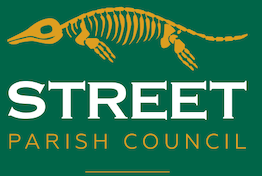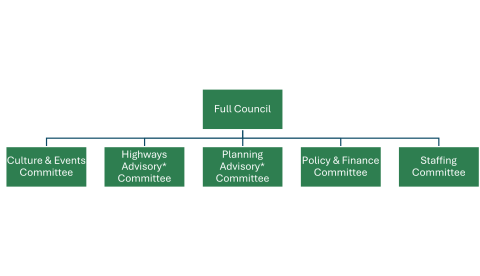Street Parish Council Structure
Overview of the structure of Street Parish Council
- Street Parish Council and the Clerk have a collaborative, hierarchical relationship.
- The Clerk is employed by the Council and acts as a Chief Executive Officer to the Council. The Clerk is responsible for carrying out the resolutions of the Council and advising the Council on legal, and procedural matters.
- The Deputy Clerk is the Responsible Financial Officer (RFO), responsible for managing the council’s finances.
- Full Council is the Employer and has sole supervisory responsibility for the Clerk.
- Staffing Committee has day to day oversight of the Clerk’s duties and first line managerial responsibility (as set out in its Terms of Reference of the Staffing Committee).
- The Clerk has full responsibility for management of Council Officers / staff.
- The Deputy Clerk deputises for the Clerk.
- Where conflicts arise, managerial oversight may be shifted in accordance with agreed HR Policies.
- Senior salaries (between £50,000-£55,000: 1 employee scale range LC3 (position: Clerk).
The Council’s Committee Structure
*Somerset Council is the principal authority for Planning decisions and Highways matters. The Parish Council are statutory consultees in all Planning Applications / associated matters and can represent the views of residents and signposting residents to further advice or support. Somerset Council is the principal authority for all Planning and Highways matters.
How does the Council work?
Certain decisions may only be made by the full council. Other decisions may be made by the Committees of the Council (these are set out in the Terms of Reference for each Committee).
In addition to its Committees, Street Parish Council have several Task and Finish Groups and Working Groups which undertake research or undertake actions delegated by the Council and report back to full council or its Committees.
A Working Group and a Task and Finish Group has no decision-making power except for where a decision has been delegated by resolution of the full council or one of its Committees.
Officers may be permitted to make decisions on behalf of the Council, or its Committees and such matters are covered in the Standing Orders, Financial Regulations and Scheme of Delegation.
Decisions are made as a collective, and individual members of the Council (Councillors) have no individual decision-making powers. This is detailed further in the Member/Officer Protocol.
Summary of roles
Council’s Role:
- Street Parish Council is the governing body, responsible for making decisions about Street’s affairs, setting policies, and representing the community.
Clerk’s Role:
- The Clerk is the council’s chief officer, providing administrative support, managing staff, and ensuring the council operates legally.
- The Clerk is also the “Proper Officer,” responsible for performing specific duties as outlined in legislation.
- Day to day management remains the responsibility of the Parish Clerk.
Hierarchical Structure:
- The council makes decisions, and the Clerk and team of employed Officers implements those decisions and provides the necessary administrative and legal support.
Collective responsibility:
- Decisions and policies, once determined, are subject to collective responsibility.
Collaboration:
- The Clerk (and Officers) works closely with the Council and Committees of the Council, providing advice and information to help them make informed decisions.
Financial Responsibility:
- The Deputy Clerk often acts as the Responsible Financial Officer (RFO), managing the council’s finances and ensuring compliance with regulations.
Chair:
- The Chair’s key role is to run council meetings.
- The Chair has a duty to ensure that council meetings run smoothly, that all business is carefully considered and all councillors who wish to speak can do so.
- The Chair has no special powers and cannot legally decide on behalf of the council or act independently.
- The Chair also represents the council at events/functions unless agreed that another representative should attend.
Councillors:
- Councillors may be elected or co-opted.
- Councillors are also referred to as ‘members’ of the Council.
- The role of Councillor is not paid, and although Councillors freely give their time to undertake their duties, Councillors are not volunteers in a legal sense. Councillors are ‘elected representatives’ and ‘holders of a public office’ with statutory duties.
- The key roles of the Councillors are to represent the views of residents and set policy and budgets and make major decisions for the benefit of Street and its residents and
- The authority of Councillors is collective and, as individuals, they have no authority to issue specific directions to the Clerk or any individual Officer.
Relevant Policies that support the governance and operations of the Council can be found on the Parish Council website:
Policies – Street Parish Council
- Member Officer Protocol
- Standing Orders
- Financial Regulations
- Code of Conduct
- Scheme of Delegation


